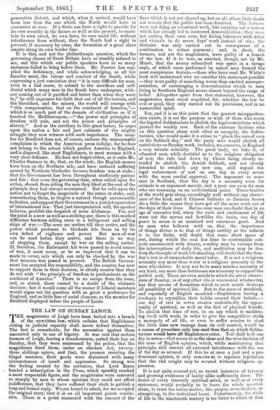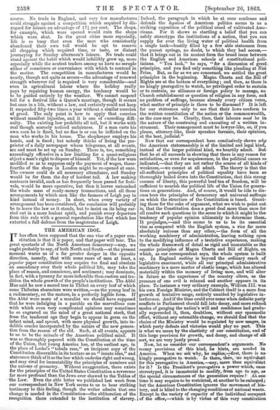THE LAW ON SUNDAY LABOUR.
THE magistrates of Leigh have been baited into a breach of the unwritten law, which ordains that Englishmen sitting in judicial capacity shall never defend themselves. The fact is remarkable, for the accusation against them amounted only to one Of bigotry. It was said that certain farmers of Leigh, fearing a thunderstorm, carted their hay on Sunday, that they were summoned by the police, that the magistrates fined them, under an obsolete Act, twenty- three shillings apiece, and that, the yeomen resisting the illegal sentence, their goods were distrained with many circumstances of insult and oppression. So strong was the feeling created by the narrative, that Lord Essex headed a subscription in the Times, which speedily reached a most respectable figure, and the magistrates were censured so sharply by men to whose opinions they could not affect indifference, that they have suffered their clerk to publish a long and formal reply. We are bound to admit, for we accepted the original story, that it is on all important points conclu- sive. There is a point connected with the amount of the fines which is not yet cleared up, but on all others little doubt can remain that the public has been deceived. The farmers were not doing an occasional work, but carrying out a system which has already led to increased demoralization ; they were not carting their own corn, but hiring labourers with drink and victuals to do seven days' work instead of six; the distraint was only carried out in consequence of a combination to refuse payment ; and, in short, the farmers, and not the magistrates, were guilty of a breach of the law. If it be true, as asserted, though, not by Mr. Marsh, that the money subscribed was spent in a savage orgie, of which races performed by naked men formed the most conspicuous feature,—those who have read Mr. White's book will understand why we consider this statement possible —they were guilty of something worse than excited misrepre- sentation, of encouraging a demoralization which to men living in Southern England seems almost beyond the range of belief. Altogether apart from that statement, however, the magistrates must stand acquitted, for, whether the law bo evil or good, they only carried out its provisions, and in no unmerciful spirit.
For, and it is on this point that the gravest misapprehen- sion exists, it is not the purpose or wish of those who resist the bigoted Sabbatarians to abolish the legal restrictions which protect the weekly rest. Each of the extreme factions who on this question abuse each other so savagely, the Sabba- tarians, who would make it a crime to " pluck the ears of corn on the Sabbath day," and the party who would abolish all restrictions on Sunday work, includes, we conceive, in England a very minute minority. The great body, we take it, of educated men, while doubtful as to the religious obligation of rest, the rule laid down by Christ being clearly in- tended to abolish the Jewish Sabbath, and not clearly intended to establish any new one, still regard the legal enforcement of rest on one day in every seven with the most cordial approval. The argument so com- mon in Scotland, that the day is a necessity even for animals is an argument merely, and a poor one even for men who are reasoning on an ecclesiastical point. Three-fourths of the world gets along exceedingly well without any observ- ance of the kind, and if Chinese bullocks or Parisian horses die a little the sooner they have got all the more work out of the days of their lives. But no sane man can doubt that in an age of excessive toil, when the rush and excitement of life wear out the nerves and bewilder the brain, one day of peace in seven is an unmixed and enormous good. And no man who believes with us, that the importance of things divine is to that of things earthly as the infinite is to the finite, will doubt that some short space of rest, during which the soul has time to contemplate sub- jects unconnected with dinner, worship may be exempt from the interruptions of daily life, and meditation may be free from the thought of work left standing, will doubt that the Sun- day's rest is of unspeakable moral value. It is not a religious necessity any more than water is a religious necessity to the man who thirsts. It may not be to many minds a necessity of any kind, any more than buttresses are necessary to support the perfect arch. There are even minds to which the strict observ- ance of Sunday, as of any other rite or ceremonial whatsoever, has that savour of formalism which to such minds destroys all possibility of spiritual life. But to the mass of mankind, and especially of English mankind.—Englishmen having a tendency to crystallize their habits around their beliefs,— one day of rest in seven creates undoubtedly the oppor- tunity of spiritual, as well as the fact of physical benefit. To abolish that time of rest, in an age which is madden- ing itself with work, in order to give the competitive strife a monopoly of all life, or even to suffer avarice to steal the little time now exempt from its evil control, would be a course of procedure only less mad than that on which Sabba- tarians would have all Englishmen enter. Toil shall halt one day in seven—that seems to us the clear and the wise decision of the mass of English opinion, which, while maintaining that principle, still resents all external interference with the use of the day so secured. If this be at once a just and a pre- dominant opinion, it only remains so to regulate legislation that the end sought may be secured without religious op- pression.
It is not quite secured yet, as recent instances of tyranny and growing evidences of laxity alike sufficiently show. The desire of every sincerely spiritual mind, as well as of every statesman, would probably be to leave the whole question alone, to trust the entire matter, like prayer, or meditation, or almsgiving, to the individual heart. Unfortunately, the strife of life in the nineteenth century is too bitter to admit of that course. No trade in England, and very few manufactures could struggle against a competition which acquired by dis- regard for leisure an advantage of 17i per cent. The shops, for example, which were opened would ruin the shops which were shut. In the great cities more especially, life is so busy that even the men who consistently abandoned their own toil would be apt to reserve all shopping which required time, or taste, or distant journeying for Sunday afternoon's leisure. No trade could stand against the habit which would infallibly grow up, more especially while the neatest traders among us have no scruple either of conscience or convenience with which to contend in the matter. The competition in manufactures would be nearly, though not quite as severe—the advantage of renewed strength wherever toil is required is very considerable—and even in agricultural labour where the holiday really pays by repairing human energy, the tendency would be to be guided entirely by the weather. We cannot suspend toil for a festival like a Queen's marriage, though it occurs but once in a life, without a law, and certainly could not keep it suspended fifty-two times a year without a similar coercion of greed. The only point is how to apply that coercion without manifest injustice, and it is one of exceeding diffi- culty. The existing law prohibits all toil, but it works with real though scarcely noticed unfairness. If a man carts his own corn he is fined, but no fine is or can be inflicted on the man who works in his house. The shopkeeper employs his hands, and is fined ; but nobody thinks of fining the pro- prietor of a daily newspaper whose telegrams, at all events, are and must be set up on Sunday. There is, too, something exceedingly offensive in a law limiting for a quasi-religious object a man's right to dispose of himself. Yet, if the law were modified so as to suppress only the payment of wages, three- fourths of the shops in London might be re-opened at once. The owners could do all necessary attendance, and Sunday would be for them the day of hardest toil. A law making contracts invalid, such as has frequently been passed for festi- vals, would be more operative, but then it leaves untouched the whole mass of ready-money transactions, and all those arrangements by which men like the farmers of Leigh pay in kind instead of money. In short, when every variety of arrangement has been considered, the conclusion will probably be to leave the law as it stands, but to insist on its being car- ried out in a more lenient spirit, and punish every departure from this rule with a general reprobation like that which has extorted a full defence from the magistrates of Leigh.































 Previous page
Previous page